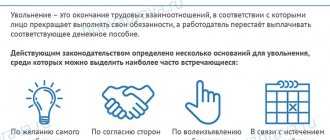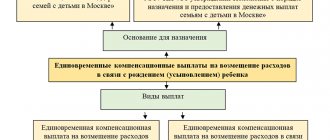Financial assistance to the relatives of a deceased employee is paid by employers on a voluntary basis. Such a request from family members of an employee who died as a result of an accident at work or died for another reason may be satisfied in any amount at the discretion of the employer. If such measures of material support are provided for in an employment contract, collective agreement or other local act of the employer, payment is made on the basis of a written request from relatives. If there is no mention of financial assistance in connection with death in the internal regulations of the enterprise, the decision on payment can be made by the founders of the company.
List of payments to relatives upon death of an employee
The death of an employee at an enterprise requires financial compensation to the close relatives of the deceased, which is made on behalf of the management of the organization. Among the main payments the following material compensations are noted:
- Wages for the period worked, which the accounting department did not manage to issue to the employee;
- Compensation for unused vacation days;
- Subsidies and benefits that were due to the employee, but were not paid as a result of the incident (benefits for temporary inability to perform work duties, etc.);
- Other payments stipulated by the employment agreement (bonuses, incentives, salary supplements).
It should be noted that personal income tax is not levied on the deceased employee’s final salary. Other payments and compensation are also not subject to taxation (the exception is royalties).
Also, Article 1183 of the Civil Code of the Russian Federation establishes a period of 4 months for relatives to apply for payment of amounts not received by a deceased employee. If this deadline is missed, then these amounts are included in the inheritance.
How to issue money?
The provision of material support is reflected in accounting documents in account 91 “Other income and expenses”, since it is not directly related to business activities. You can provide separate subaccounts (91-1 - “Other income”, 91-2 - “Other expenses”).
According to accounting, this is carried out in accordance with Order of the Ministry of Finance No. 94N dated October 31, 2000:
| Operation | Debit | Credit | A document base |
| Calculation of financial assistance | 91(91-2) | 76 | Manager's order |
| Payment of funds | 76 | 50 | Account cash warrant |
In certificates and tax documents (2-NDFL, 6-NDFL), cash flows are reflected using special income codes (Federal Tax Order No. ММВ-7-11 / [email protected] dated 09/10/2015).
However, among the codes there are no ones assigned to financial assistance to the employee’s relatives in connection with his death. Therefore, there is no need to indicate it.
Amount of financial assistance upon death of an employee
The amount of payments provided for by local charters, as well as the employment agreement, is negotiated personally by the head of the enterprise and the relatives of the deceased person, if a specific amount is not provided for in the documents themselves.
The same applies to compensation that the head of the enterprise pays on his own initiative. There are different calculation rules when paying funeral benefits for a deceased employee, since this is a type of insurance coverage for citizens. The funeral benefit is paid to the person who has assumed the responsibility for burying the deceased, and is due to both citizens of the Russian Federation and foreign persons (Clause 1, Article 10 of the Federal Law of January 12, 1996 N 8-FZ “On Burial and Funeral Business” ( (hereinafter referred to as Law No. 8-FZ) Even if the relatives of the deceased person buried him at their own expense, they have the right to submit an application addressed to the head of the enterprise in order to compensate for the losses incurred.
Important! You can receive compensation for the funeral of a deceased employee only within 6 months from the date of the citizen’s death. If this deadline is missed, payment may be refused (Clause 3, Article 10 of Law No. 8-FZ).
At the legislative level, the funeral amount is set at 5,946.47 rubles. According to legal norms, it is subject to annual indexation approved by the Government of the Russian Federation. In 2021, the payment amount was 6,124.86, taking into account indexation equal to 1.03 (Resolution of the Government of the Russian Federation No. 61 of January 29, 2021).
It is possible that a regional coefficient increasing the amount of payments may also apply. The amount indicated above is valid at the federal level, however, each enterprise may set its own amount of compensation, which is greater than that established by law. Then funeral payments are paid from the enterprise budget.
FAQ
Question No. 1. My brother died, he has no other relatives. Do I have to enter into an inheritance in order to receive my employer’s salary?
No, entering into inheritance is not a prerequisite. To receive payments, it is enough to contact the organization at the last place of employment of the deceased.
Question No. 2. Can I receive funeral benefits from my employer if the deceased quit his job the day before his death?
No, in this case you need to apply for benefits to Social Security, because the employment relationship between the employee and the employer is terminated due to termination of the contract.
Calculation of payments
The calculation of payments due to the deceased employee is carried out by the accounting department.
Wages depend on the number of days the employee has worked. Compensation for unused vacation is calculated in a different way. To calculate compensation for unused vacation periods, the accountant must calculate two important points: the number of days of unused annual leave, the average daily income.
The average daily income level is calculated using the following formula:
OT annual/12/29.3, where:
- OT annual is the salary for 12 months;
- 12 - number of months in a year;
- 29.3 is the coefficient for calculating the average monthly number of days in the calendar, regulated by law (Article 139 of the Labor Code of the Russian Federation).
Salary does not include all payments received by an employee. Thus, the following funds are not taken into account:
- Performing job duties while maintaining salary (business trip);
- Compensation for sick leave.
If a deceased employee has accumulated unused vacation days over several years, they are added up. For the final calculation of compensation, it is necessary to calculate using the following formula:
Average salary per day * total number of unused vacation days
Download for viewing and printing:
Article 139 of the Labor Code of the Russian Federation “Calculation of average wages”
conclusions
Thus, the employer has the right, but not the obligation, to provide financial assistance to family members of his former employee in connection with his death.
The decision on payments is made either by the founders or the director, but only if this is stipulated in the local acts of the legal entity.
The amounts depend on the financial capabilities of the employer and other factors. If the recipient is a member of the deceased’s family, personal income tax is not deducted from the financial assistance.
If the funds are paid to another person, the taxable base is only 4 thousand rubles. in year.
Who receives the money of a deceased employee?
Material payments due to the death of an employee at the enterprise are awarded to close relatives of the person, as regulated by labor legislation. Among this list of persons are noted (Article 2 of the Family Code of the Russian Federation):
- Spouse.
- Parents or adoptive parents.
- Natural or adopted children.
Also, funds can be issued to citizens who were dependent on the deceased employee. To confirm this fact, you must obtain a certificate from the judicial authority.
Who can receive compensation?
If a citizen worked officially at an enterprise, his death does not mean that management is released from obligations to pay wages and other types of payments. Only relatives of the deceased can receive them. These include:
- Children;
- Parents;
- Spouses.
If the above persons are absent, other citizens from among relatives have the right to apply for money.
Important! In some cases, payments can be received not only by relatives, but also by persons who were dependent on the deceased during the last 12 months and lived with him. As for relatives, living together is not necessary for them.
Arranging for funeral compensation
One of the additional compensations that relatives of a deceased person can count on is subsidies for the burial of the deceased. Payments are made from the budget of the organization in which the deceased employee worked. So, in order to receive this compensation, the organization must provide:
- Application in any form.
- Employee's death certificate.
This package of documents remains with management for further confirmation of payments made during the inspection of the Social Insurance Fund.
Documents for receiving payments
Any legal procedure requires documentary evidence of the actions of the parties. Thus, relatives of a deceased employee of an enterprise must provide management with the following information:
- Passport of a relative of the deceased person;
- Application for the issuance of funds;
- A copy of the death certificate;
- Certificate of relationship with the deceased (marriage certificate, birth certificate).
Sample application:
Common Mistakes
Mistake #1. The employer paid all funeral expenses, but relatives can still apply for funeral benefits.
No, this is a mistake. This benefit is paid only if relatives have spent their own funds.
Mistake #2. The deceased relative worked unofficially, but relatives can collect wages from his employer.
No, this is a question of the conscience of the former leader. According to the law, there is no labor relationship between them, and in order to receive payments, you will first have to establish the fact of employment, and only after that you can apply for payments.
Personal income tax and insurance premiums in 2021
Financial assistance provided by an employer in connection with the death of a family member or family members of a deceased employee is not subject to personal income tax (clause 8 of Article 217 of the Tax Code of the Russian Federation). Therefore, there is no need to reflect such income in certificate 2-NDFL and form 6-NDFL. This is confirmed by letter of the Ministry of Finance dated April 18, 2012 No. 03-04-06/8-118.
If, for example, an employee’s distant relative (for example, a cousin) has died, and the employee, as a funeral organizer, asks the employer for financial assistance, then the amounts received are not subject to personal income tax only up to 4,000 rubles. (clause 28 of article 217 of the Tax Code of the Russian Federation). Any amount above this limit is subject to tax. The point of view of the Ministry of Finance is defined in the letter dated December 15, 2016 No. BS-4-11/ [email protected]
Order of the Federal Tax Service of the Russian Federation dated September 10, 2015 No. ММВ-7-11/ [email protected] establishes special codes for income and deductions reflected in personal income tax reporting forms:
- income code 2760 - financial assistance provided by employers to their employees;
- deduction code 503 - deduction from the amount of financial assistance provided by employers to their employees.
These codes are indicated in the following reporting forms: certificate 2-NDFL and form 6-NDFL.
Insurance premiums
Insurance premiums are levied on payments and other remuneration that are made in favor of individuals who are subject to compulsory insurance (Article 20.1 of Law No. 125-FZ of July 24, 1998 and Article 420 of the Tax Code of the Russian Federation). But the targeted nature of material assistance provided to an employee in connection with the death of his family members allows such income to be excluded from the taxable base for contributions (clause 3, clause 1, article 20.2 No. 125-FZ and subclause 3, clause 1, article 422 of the Tax Code RF).
Who can receive payments and benefits
If a person died while in an official labor relationship, then all payments from management must be made to his immediate family. Such as:
- husband/wife;
- parents;
- children;
- persons who were actually dependent on the deceased. This is stated in Art. 141 Labor Code of the Russian Federation;
- other relatives if the deceased does not have first-degree heirs.
It is enough for the closest relatives to present documents confirming their relationship with the deceased. This could be a marriage or birth certificate, certificates from the registry office, or so on. But, if a dependent applies for money, then you need to present a court decision recognizing him as such.
Reasons for providing assistance
The list of events and reasons in the event of which an employee can count on assistance from the enterprise is approved by the employer. Common reasons include:
- Extraordinary circumstances – loss of property or damage caused by natural or natural disasters.
- Medical indications – illness, disability or need for recovery.
- Family circumstances - the birth or adoption of a child, illness or loss of a loved one.
- Personal motives - difficult financial situation, anniversary, retirement.
- Other situations determined by the employer and enshrined in internal documents.
The employer makes a decision on payment and amount based on the application. The application is accompanied by documents confirming the reason for providing assistance - a child’s birth certificate, an employee’s death certificate, certificates of the family’s financial condition, and other forms. A positive decision on the application is reflected in the entry on the document and order. On the application, the manager makes a note about the amount and source of payment. The document contains information:
- Details of the person receiving financial assistance. Indicate the full name, position of the employee or passport details of the retired person.
- Link to internal document for assistance.
- Individual reason or circumstances for payment.
- Amount provided in aid.
- Date of payment for urgent reasons.
The order is sent to the accounting department to provide the basis for calculating the amount and taxes, making payments and deductions to the budget. Payment in any form is allowed - cash or non-cash transfer.
How to charge in 1C
Many accountants often ask the question: how to reflect in 1C:Enterprise financial assistance to an employee in connection with the death of a relative? The answer depends on the version of the special 1C software product.
So, for example, in 1C: Salary and HR management, accrual is carried out using a special document “One-time benefit”. You can find it by pressing the F1 button and calling up the search window. In the search bar that appears, enter the letter query “burial.”
Or select the “Salary” section, then the “All documents” item, click the “Create” button. Select “One-time benefit” from the list provided.
What documents are needed
To receive funds, you must prepare a package of documents, which includes:
- passport of the citizen who applied for compensation;
- a copy of the document confirming the death of the employee. If he is declared dead by the court, then an extract from the court decision is required;
- a document that confirms the existence of family ties between the deceased employee and the one who wishes to receive funds;
- an application addressed to the manager with a request for payment.
Information
There is no unified application form, so it must be submitted in a free but written form. The paper is written addressed to the head of the enterprise where the deceased was officially employed.
Amount of payments from the state
As we noted above, the specific amount of financial assistance upon the death of a close relative (2020) depends on its type. For example, public funds are limited by current legislation, namely by Decree of the Government of the Russian Federation dated January 26, 2018 No. 74. Currently, government payments are equal to 5,701.31 rubles.
IMPORTANT!
If a territorial (district) coefficient is established in the region, then the amount of financial assistance should be increased by this increasing coefficient.
Please note that some regions of Russia have approved higher values for financial assistance for funerals in 2021. So, for example, in Moscow the state payment is 11,000 rubles. This depends on the financial and economic level of the subject of the Russian Federation.
Basic provisions
The term “material assistance” first appeared during the Soviet Union.
This definition, in the context of the topic under consideration, means financial support that is provided to people in need by government agencies (Pension Fund, Social Security Department), Social Insurance Fund, insurance organization or direct employer. The following can count on receiving financial assistance:
- large families (3 or more children);
- pensioners over 65 years of age;
- university students with a disability group;
- children raised by disabled parents.
Payments are provided in connection with family circumstances:
- the need for expensive treatment or surgery;
- difficult financial situation;
- birth of a child;
- death of a close relative.
Attention! Such payments are always one-time in nature.
Issued by
If we talk about payments related to the death of a relative, the following may qualify for them:
- Employed citizens - those who have a permanent place of employment, or those working on the basis of fixed-term contracts.
- Unemployed citizens - this category includes everyone who cannot document their employment or is officially unemployed, including pensioners.
In the first case, support is provided by the direct employer from the funds of the enterprise, if this is prescribed by a collective or labor agreement, and this financial assistance can also be established in an industry or territorial agreement in force in relation to the organization to which the employer belongs. If the deceased person, the legal representative of a deceased minor, or a member of his family was insured under the compulsory social insurance program, then financial support will come from the accounts of this organization.
Important! The Social Insurance Fund will support financial assistance if the deceased was insured by this fund or the legal representative of the deceased minor or a member of his family.
When applying to social security authorities, the amount and procedure for payments are regulated at the federal level, so the procedure for obtaining assistance looks simple and clear. In the case of enterprises and commercial organizations, the situation looks ambiguous.
Download for viewing and printing:
Article 10 Federal Law of January 12, 1996 N 8-FZ _On burial
If we are talking about the death of an employee’s relative, the employer is not at all obliged to provide financial support. There is not a single regulatory act for this in labor or federal legislation. The maximum you can claim under the law: 5 days of leave at your own expense due to the death of a loved one.
The financial side of this issue remains at the discretion of the head of the enterprise. The only exceptions to this rule are:
- The company’s internal policy provides for assistance to employees in the event of the death of close relatives.
- A written order for the provision of financial support, signed by the General Director or his substitute.
Important! Employees do not have the right to demand payments from their immediate superiors in connection with the death of relatives. In fact, providing such assistance is a voluntary initiative of the enterprise.
Who is considered a close relative?
At first glance, this is a rather vague concept, however, the Family Code of the Russian Federation, in particular Article 14, clearly limits the circle of close relatives.
Family members include spouses, parents, children, adoptive parents and adopted children, but sometimes other relatives may also refer to family members (for example, grandmother, brother) who live together and run a joint household with the employee (Letter of the Ministry of Finance of Russia dated December 2, 2016 N 03-04-05/71785).
To determine close relatives, consanguinity in an ascending or descending line is taken into account.
In the first case, close relatives are considered:
- parents;
- children;
- grandmother;
- grandfather.
In the second:
- full brothers and sisters;
- half-siblings (who have the same father or mother).
Note that spouses, according to the letter of the law, are not considered close relatives, however, they are by default included in the circle of recipients, as well as adopted children or guardians.
Legal basis
Issues of financial assistance in connection with the death of a close relative are regulated by the following regulations:
- Federal Law 8-FZ “On Burial” regulates the issue of bodies providing financial assistance, its amount, etc.
- Tax Code, Article No. 217 - the procedure for exempting types of financial assistance from personal income tax.
- Labor Code, Article No. 41 - providing financial assistance to employees of the organization.
This includes Federal Law No. 1032-1, adopted for execution on April 19, 1991. In particular, Article 36, which regulates the provision of financial assistance to unemployed citizens of Russia when sent to training by employment authorities.
Download for viewing and printing:
Article No. 217 Tax Code of the Russian Federation (TC RF)
Article No. 41 Labor Code of the Russian Federation of December 30, 2001
Results
Reflection in the accounting of material assistance issued on a general basis (death of a loved one, wedding, birth of a child) and financial assistance for vacation is different.
Also, the choice of account to reflect financial assistance depends on whether the recipient is an employee of the company or not.
The reflection of how the payment is made is the same as for other similar transactions:
- when financial assistance is issued from the cash register, postings are made to the credit of account 50 “Cashier”;
- when payment is made non-cash - to account 51 “Bank”.
Read also
16.06.2020
Taxation of amounts due to a deceased employee
Upon the death of an employee, all income taxes withheld cease to be remitted. The last salary, vacation compensation, and sick leave are not subject to tax withholding.
Heirs who have entered into rights pay only those taxes that were not paid during the life of the deceased, and namely:
- Property;
- Transport;
- Land.
Good to know! Income received as an inheritance is not taxed, with the exception of copyrights for works of art, literature, music, art, inventions and patents.
The death of a person is not only grief for loved ones. A good professional in his field is always appreciated and remembered at work. Management and colleagues will always help to see off the last journey with dignity, paying off all the company’s debts to the relatives of the deceased employee.
Didn't find the answer to your question? Find out how to solve exactly your problem - call right now: +7 (Moscow) +7 (812) 309-53-42 (St. Petersburg) It's fast and free!
To whom does the employer provide swearing support?
As a rule, financial assistance in connection with death is provided to family members of the deceased employee.
The circle of these persons is determined in accordance with Art. 2 of the RF IC, which is confirmed by letter of the Ministry of Finance No. 03-05-01-04/234 dated 08/03/2006.
A citizen’s family includes:
- his husband;
- children (natural and adopted);
- parents (natural and adoptive parents).
The court may include other people from the family of the deceased as family members, most often close relatives and dependents . Established family and household connections are taken into account.
In practice, the courts recognized the family of the deceased as their common-law spouses and grandparents, who were actually supported by the deceased.
The employer has the right to pay financial assistance to persons who do not belong to the family members of the deceased employee. But in this case it will be subject to personal income tax (13%).
How to pay money to relatives?
To receive financial assistance in the event of the death of an employee, an application is written to the last employer of the deceased . There is no exact sample, you can fill it out in free form by hand.
Many companies produce their own forms and stipulate their use in internal regulations. This should be clarified with the secretary, accountant or HR specialist.
Additionally you will need:
- certificate of an employee from the registry office or a court decision declaring him dead or missing;
- documents confirming family relationships or other connections with the deceased employee. Birth certificates, marriage certificates, court documents, etc. are suitable.
Read more: Is income tax taken from the minimum wage?
If financial assistance is provided for by the company’s regulatory documents, its appointment is formalized by an order signed by the director .
Otherwise, the decision on payment is made by the founders of the company (not the director or other hired employees, even the management team).
If there are several owners, the issue is considered at a general meeting. Based on the results, a protocol is drawn up.
It must indicate the date, location of the meeting, a list of all participants, topics on the agenda, the form of voting, and its results.
The organization has the right to develop its own protocol form.
The sole founder considers the petitioner’s application independently and puts a resolution on it.
After the owners’ decision, the director issues and signs an order to issue financial assistance.
Funds are paid either in cash from the company’s cash desk or by bank transfer. In any case, an expense cash order is generated.
Amount of payment to the family of a deceased employee
The law does not establish limits on the amount of financial assistance in the event of the death of an employee: everything depends on the financial capabilities of the company. They are usually regulated by internal regulations.
The source of payments is the organization’s own funds. Most often, companies form a fund using retained earnings from previous periods or the current year.
Taxation - personal income tax and insurance premiums
The application of personal income tax (personal income tax, 13%) depends on who received the financial assistance:
- family members - not taxed in full (Article 217 of the Tax Code of the Russian Federation, Letter of the Ministry of Finance No. 03-04-05/70419 dated October 26, 2017);
- other relatives - not subject to personal income tax only up to 4,000 rubles. in year.
In the first case, one more condition must be met: financial assistance is provided at a time . This is understood as a payment that is provided for specific purposes no more than once in a tax period (year), for a certain circumstance.
It doesn’t matter whether it’s a lump sum or in parts. This definition is given by the Tax Service of the Russian Federation in letter No. 3-5-04 / [email protected] dated March 10, 2009.
Payments on the same basis, but issued by different orders of the head of the company, are not considered one-time payments. What does this mean in practice?
For example, due to the death of an employee, his wife contacted the company twice.
Both times the founders decided to help her. Accordingly, the director issued 2 orders.
Such assistance can no longer be called one-time; it is subject to personal income tax.
Financial support for a relative of a deceased employee is not wages or other remuneration for work.
Therefore, she does not pay insurance premiums to the Social Insurance Fund or the Pension Fund of the Russian Federation - read more about the assessment of contributions.
This is confirmed by Art. 422 of the Tax Code of the Russian Federation and Art. 20.2 Federal Law No. 125 dated July 24, 1998. Expenses associated with the payment of financial assistance are not taken into account when calculating income tax.










